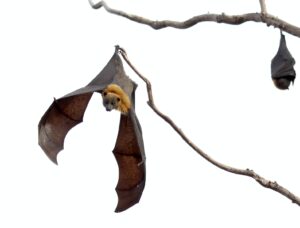If you’ve ever had a bat fly into your home, you probably know how scary it can be. For centuries, bats have been associated with darkness, death, and disease, leading many people to believe that having them in your house is a bad omen. However, in reality, bats are fascinating creatures with many benefits to offer. In this article, we’ll explore the myths and realities of having bats in your house and help you understand why they may actually be good for you.
The Myths
Bats Bring Bad Luck
One of the most common myths about bats is that they bring bad luck. In many cultures, bats are seen as symbols of darkness and death, leading people to believe that a bat in the house is a sign of impending doom. However, there is no scientific evidence to support this claim, and it is nothing more than a superstition.
Bats Cause Illness and Disease
Another common myth about bats is that they are carriers of disease and can make you sick. While it is true that some species of bats can carry diseases like rabies, the chances of getting sick from a bat are actually quite low. In fact, according to the Centers for Disease Control and Prevention (CDC), less than 1% of bats carry rabies, and the vast majority of bats do not pose a threat to human health.
Bats Foretell Death
Perhaps the most disturbing myth about bats is that they foretell death. This belief has been around for centuries, with many people claiming that the appearance of a bat in the home is a sign that someone will die. However, there is no scientific evidence to support this claim, and it is simply a superstition.
The Realities
Bats are Insect-Eaters
Contrary to popular belief, bats are not blood-sucking vampires. In fact, the vast majority of bat species feed on insects, making them valuable pest controllers. A single bat can eat thousands of insects in a single night, helping to reduce the number of mosquitoes, flies, and other pests around your home.
Bats are Harmless
Despite their scary reputation, bats are actually quite harmless. They are not aggressive animals and will only bite if they feel threatened or cornered. If you do happen to find a bat in your home, the best course of action is to leave it alone and let it find its way out.
Bats are Important for the Ecosystem
Bats play a vital role in the ecosystem, helping to pollinate plants and spread seeds. They also help to control insect populations, which can have a significant impact on agriculture and forestry. Without bats, many plant and animal species would suffer, and the ecosystem as a whole would be thrown out of balance.
What to Do If You Have Bats in Your House
If you do happen to find bats roosting in your home, there are several things you can do to safely remove them. The first step is to identify where the bats are entering and exiting your home. This can often be done by watching for bat activity at dusk or dawn. Once you have identified the entry points, you can install one-way bat valves that allow the bats to leave but prevent them from re-entering.
It is important to note that bats are protected by law in many areas, so it is important to follow the proper protocols when removing them. Contacting a professional wildlife removal service is often the safest and most effective way to remove bats from your home.
Benefits of Bats in Your Home
While some people may be hesitant about having bats in their home, there are actually many benefits to coexisting with these winged mammals. Here are some of the benefits of having bats in your home:
Pest Control
As previously mentioned, bats are excellent pest controllers. They feed on a variety of insects, including mosquitoes, flies, and moths, which can help reduce the number of pests around your home. In fact, a single bat can eat thousands of insects in a single night, making them a valuable ally in the fight against pests.
Pollination
In addition to controlling pests, some species of bats also play a role in pollinating plants. Fruit bats, for example, are important pollinators of fruit trees and other plants in tropical regions. By helping to spread pollen from plant to plant, bats play a vital role in maintaining healthy ecosystems.
Nutrient Cycling
When bats roost in your home, they produce guano, or bat droppings. While this may not sound like a benefit, bat guano is actually a valuable fertilizer. It is rich in nitrogen, phosphorus, and other nutrients that plants need to grow. In fact, bat guano has been used for centuries as a natural fertilizer in many cultures.
Educational Opportunities
Having bats in your home can also provide educational opportunities for children and adults alike. By observing these fascinating creatures up close, you can learn about their behavior, habitat, and role in the ecosystem. This can help foster a greater appreciation and understanding of the natural world.
FAQs
- Are bats dangerous to humans?
- While some species of bats can carry diseases like rabies, the chances of getting sick from a bat are actually quite low. Bats are not aggressive animals and will only bite if they feel threatened or cornered.
- How do I know if I have bats in my house?
- You may notice bat droppings, or guano, in your attic or other areas of your home. You may also hear scratching or chirping noises at night, which can indicate the presence of bats.
- What should I do if I find a bat in my house?
- The best course of action is to leave it alone and let it find its way out. If you do need to remove the bat, wear gloves and use a towel or other object to gently scoop it up and release it outside.
- Can I get rid of bats on my own?
- While it is possible to remove bats from your home on your own, it can be dangerous and is often best left to professionals. Bats are protected by law in many areas, so it is important to follow the proper protocols when removing them.
- How can I prevent bats from entering my home?
- You can prevent bats from entering your home by sealing up any gaps or cracks in your roof or walls. You can also install one-way bat valves that allow the bats to leave but prevent them from re-entering.
Conclusion
In conclusion, having bats in your house is not necessarily a bad thing. While they may be associated with superstitions and myths, the reality is that bats are fascinating creatures that offer many benefits to the ecosystem.

